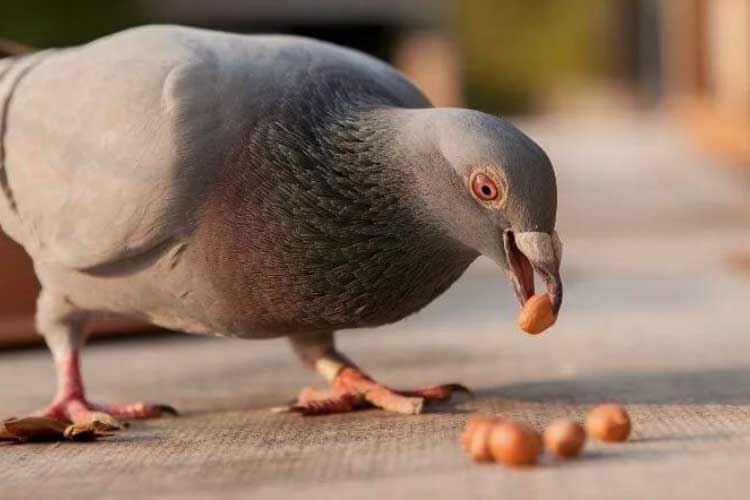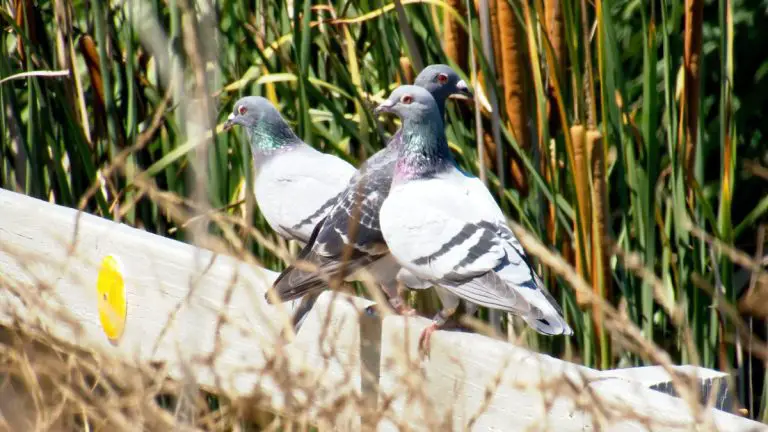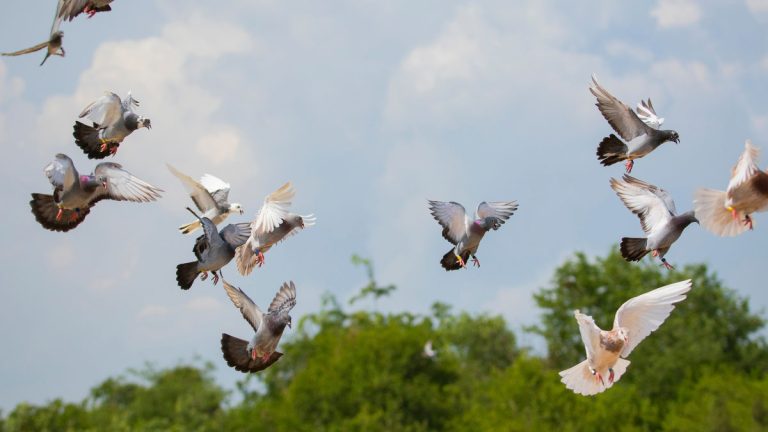What Not To Feed Pigeons? A Complete List
If you’re a beginner pigeon pet owner, you may be looking for info on what types of food to avoid for your new feathered friend. You may also encounter these birds in your neighborhood or when enjoying a walk in the park and become tempted to share your snack with them. In this case, you’ll first need to ensure that whatever you feed them is safe and healthy for them.
So, what not to feed pigeons? Some of the foods to avoid giving pigeons include junk foods, salty foods, onions, garlic, avocados, caffeine beverages, high-fat foods, chocolate, dairy products, alcohol, xylitol, and raw beans. Additionally, you should avoid fruit pits and seeds, spoiled and moldy foods, or feeding any type of food to the pigeons in excess.
In this guide, we’ll discuss full details about all the foods that you should avoid feeding your pigeons. We’ll also shed some light on the health risks that come with feeding these birds each of these unsafe types of foods.
What not to Feed Pigeons
Feeding pigeons is a common practice in many places. If you have a pet pigeon, you’ll also need to feed them with a proper diet to keep it strong and healthy.
That said, you need to be aware of what you feed these birds, as some foods can be toxic and harmful to their health.
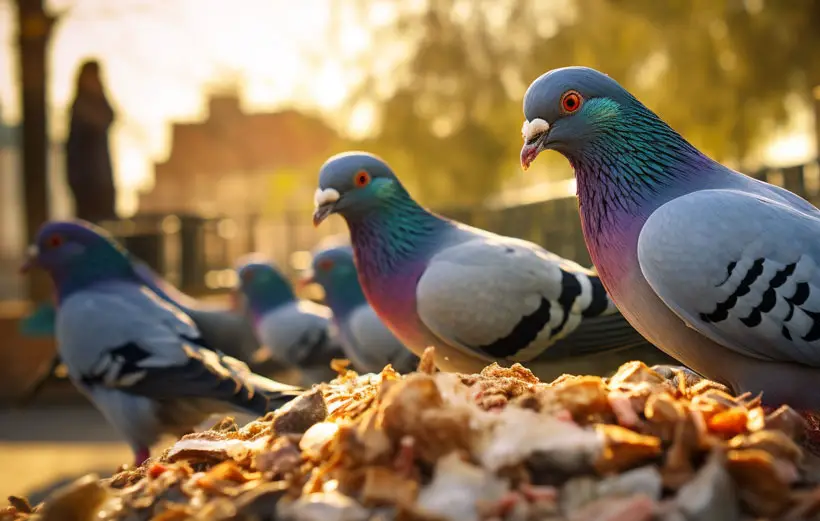
Here’s a list of foods to avoid feeding your pigeons:
Junk food
One of the foods you should completely avoid feeding your pigeons is junk food. This includes processed foods such as cookies, chips, and sugary snacks.
These foods are unhealthy for your bird’s consumption and can lead to obesity as well as other health complications.
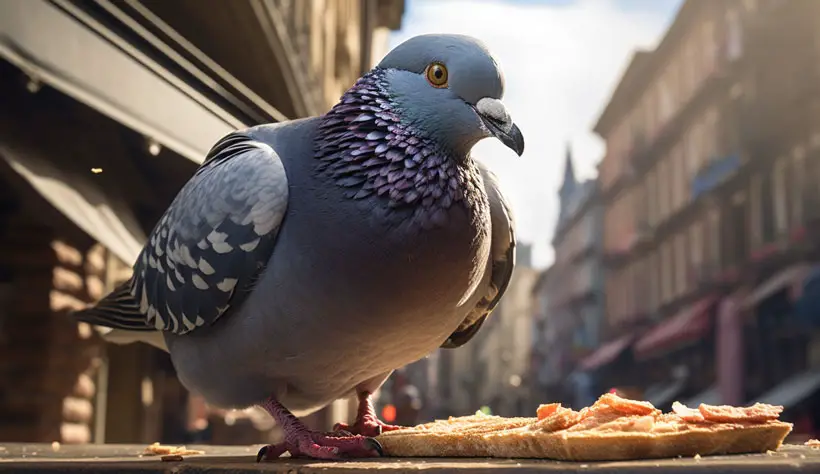
Salty foods
Just as much salt isn’t good for us humans, it’s also not safe for birds. Unlike humans who still need salt, you should completely avoid giving any salty foods to pigeons.
Even a little bit of it can prove toxic and potentially kill your bird. You may think that just a single salted chip, popcorn, or pretzel is safe for the bird but it is NOT.
It can easily upset the fluid and electrolyte balance in the tiny body of the pigeon. This will in turn cause dehydration and excessive thirst.
In severe conditions, it can cause kidney failure and death of the feathered creature.

Alcohol
The pigeon’s system is highly sensitive to alcohol, making alcoholic beverages another type of food you should avoid feeding to the bird.
As this study suggests, birds drinking alcohol from beverages such as beer, spirits, and wine are more common than you may think.
Feeding alcohol to these birds is not only harmful but also an inhumane act. It can be toxic to the birds and lead to health issues, including damage to the bird’s vital organs, or even death.
Just like in humans, alcohol may also lead to incoordination and disorientation in pigeons.
Caffeinated beverages
You should also avoid giving your pigeons any types of caffeinated beverages, including tea, coffee, soft drinks, etc.
While these taste great and help stimulate us, they are not safe for pigeon consumption.
Just a sip of a caffeine product can increase the pigeon’s heart rate, induce hyperactivity and arrhythmias, and even result in cardiac arrest.
Instead of caffeinated beverages, give your pigeons clean and fresh water to keep them hydrated without endangering their health.
Chocolate
Chocolate, regardless of the quantity, can also prove toxic and fatal if ingested by pigeons as it contains caffeine and theobromine.
These can result in issues like diarrhea, vomiting, hyperactivity, seizures and tremors, increased heart rate, and even death in pigeons.
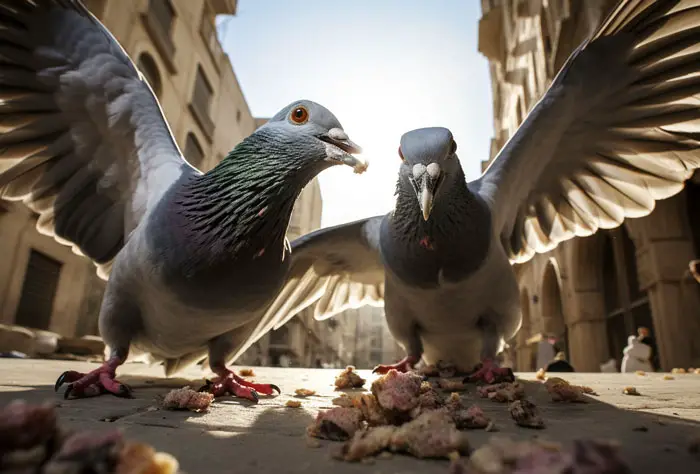
High-fat foods
High-fat foods are necessarily unsafe or toxic for pigeons. However, they’re unhealthy for them as they can easily lead to obesity.
For this reason, we also advise you against sharing any high-fat foods with these birds. This should include nuts, which carry high amounts of fats.
Just a single (unsalted) nut a day is enough for a larger bird like a pigeon. Avoid the temptation to overfeed nuts to your pigeons no matter how much they like it.
Avocado
Avocado is also known to be a highly toxic food not just for pigeons but for many other birds.
The fruit contains a toxin called persin, which if ingested by a pigeon may lead to respiratory issues, heart damage, and even death.
While some people may argue that they have fed pigeons with avocados without any effects, it’s still advisable to avoid them as it’s hard to know the right types of avocados to feed your birds.
Also, it can be challenging to know how much of this fruit is safe for your birds.
As such, it’s advisable to simply avoid feeding avocado or any avocado-containing foods, eg guacamole, to your pigeons.
Raw beans
Uncooked beans are also unsafe for consumption by pigeons as they contain a toxin known as hemagglutinin.
Avoid giving dried beans to your pigeons to prevent them from experiencing health complications due to ingestion of this toxin.
If you must give beans to the birds, make sure you cook them first.
Garlic and onions
While garlic and onions are associated with many health benefits for humans, the same cannot be said for pigeons and various other animals.
Garlic, in particular, contains allicin, a chemical that can easily cause weakness and anemia in pigeons.
Onions, on the other hand, carry sulfur compounds which if chewed can irritate the bird’s crop, esophagus, and mouth, and cause ulcers.
In severe cases, it can lead to red blood cells rupturing, resulting in anemia.
Tomatoes
Fresh tomatoes are generally safe for consumption by pigeons and aren’t toxic in any way. However, most vets usually recommend against feeding them to birds in general.
This is due to their highly acidic nature which can easily irritate the digestive system of your bird.
Dairy products
Dairy products are harmful to pigeons, especially when given in large amounts. As such, you want to be mindful of how much of these products you give to the birds or just avoid them altogether.
Generally, small amounts of dairy products, say a nibble or two are safe for the pigeons. It gets even safer if the products have low levels of lactose, e.g. cheese.
However, feeding excess amounts of dairy can lead to diarrhea in the birds, as their systems are unable to digest the lactose in the dairy.
Fruit pits and apple seeds
Most of the fruits are generally safe for pigeon consumption, provided they eat them in small amounts.
However, some foods contain seeds (e.g. apples and pears) and pits (e.g. cherries, plums, nectarines, peaches, etc.) which contain small quantities of the harmful cardiac-toxic cyanide compound.
Therefore, you should avoid giving such fruits to the birds without first removing the seeds and pits.
However, this doesn’t apply to seeds from other fruits such as watermelon, pumpkin, citrus fruits, grapes, and berries. These are safe for pigeon consumption.
Still at it, make sure you thoroughly wash any type of fruit before giving it to the birds.
This will help eliminate any pesticide and herbicide residue that may have been left on the fruit skin.
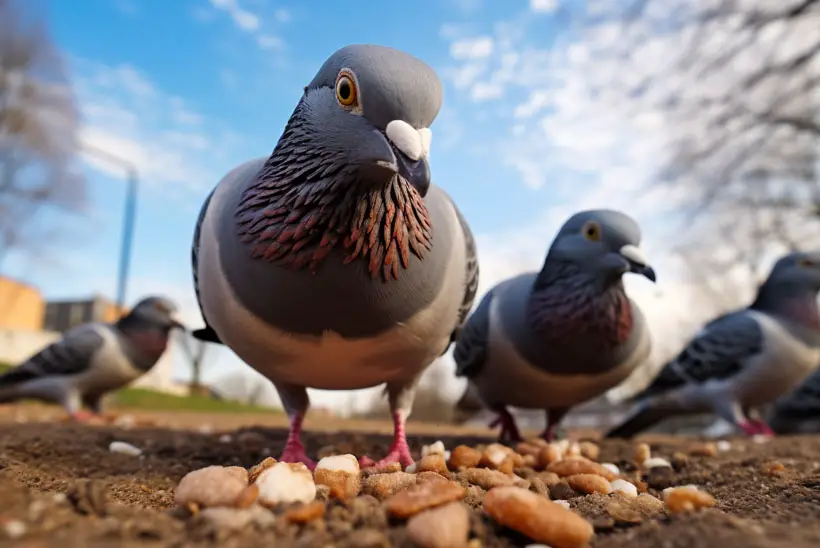
Xylitol
Xylitol is an artificial sweetener present in many diet foods as well as in sugarless gum.
This substance has been shown to cause liver damage, hypoglycemia, weakness, incoordination, and even death in animals like dogs.
However, its effects haven’t been studied in pigeons and other birds.
But the fact that birds generally feature a faster metabolism compared to other animals means their system can become quite sensitive to the toxic effects of even the tiniest levels of xylitol.
As a result, we advise you to completely avoid giving any foods containing this chemical to your feathered friends.
Seeds or nuts with shells
Pigeons love seeds and nuts, no doubt! However, you’ll need to be careful how you feed these types of foods to them to prevent potential health problems from arising.
In the case of nuts such as peanuts, you’ll need to first remove the shell. This is because it can easily grow mold on the inside if it gets wet.
Since these birds won’t get rid of the shell first, they may end up ingesting mold which can get them sick. Make sure you only give shelled nuts or seeds to your pigeons.
Moldy or spoiled food
Spoiled or moldy foods include any type of food that has gone bad due to exposure to bacteria, air, or moisture.
This can cause the food to discolor, grow mold, develop undesired odors, and bear unusual texture.
Avoid feeding pigeons this type of food, as they can easily get ill from consuming mold or spoiled food. These foods can upset the bird’s digestive system, making it feel uncomfortable and unwell.
These foods may also contain harmful bacteria and fungi that could result in infections in the pigeons.
Above all, such food may be unappealing to the birds due to its undesired taste and smell.
Pigeons, like most other animals, would prefer eating fresh and uncontaminated foods.
Feeding any type of food in excess
This goes to all types of food, whether toxic or non-toxic that you feed to your pigeons.
Moderation is key when it comes to properly feeding your pigeon to ensure they obtain a healthy and balanced diet.
Overfeeding one type of food can lead to malnutrition and health problems. Like in the case of nuts, excessive feeding can result in obesity.
And be sure to provide them with clean and fresh water to ensure they stay hydrated at all times.
What not to Feed Pigeons in Winter
In winter, you should avoid feeding your pigeons all the foods we have listed above. These include junk foods, processed foods, bread, dairy products, high-fat foods, caffeinated beverages, avocados, garlic, onion, etc., as they’re toxic and unsafe for their consumption.
Instead, you should give the birds their usual diet that primarily contains seeds and grains, fruits and veggies, and clean and fresh water.
Alternatively, you can get specially formulated foods for your pigeons from pet stores. This will ensure your birds obtain all the necessary nutrients and stay strong and healthy at all times.
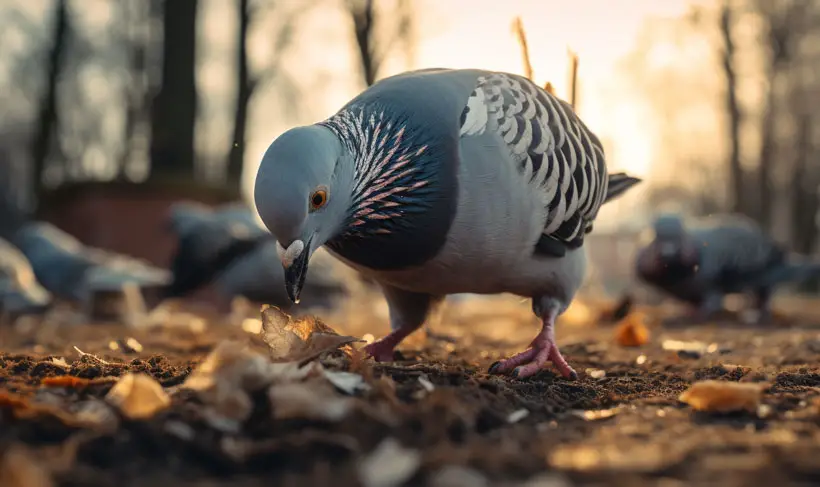
What Vegetables Do Pigeons Eat?
Pigeons are known to consume a wide variety of vegetables as they provide them with essential nutrients that keep them healthy.
Some of the most common and safe veggies for pigeons include spinach (only in small amounts), cabbage, carrots, bok choy, lettuces, broccoli, dandelion greens, bell peppers, kale, cauliflower, etc.
What Grains do Pigeons Eat?
The most common types of grains consumed by pigeons include wheat, corn (cracked), sorghum, millet, safflower seeds, wheat, barley, rice, and oats.
A mixture of 2-5 of these grains helps provide the birds with essential nutrients like carbohydrates, proteins, and others to help maintain their health and energy levels.
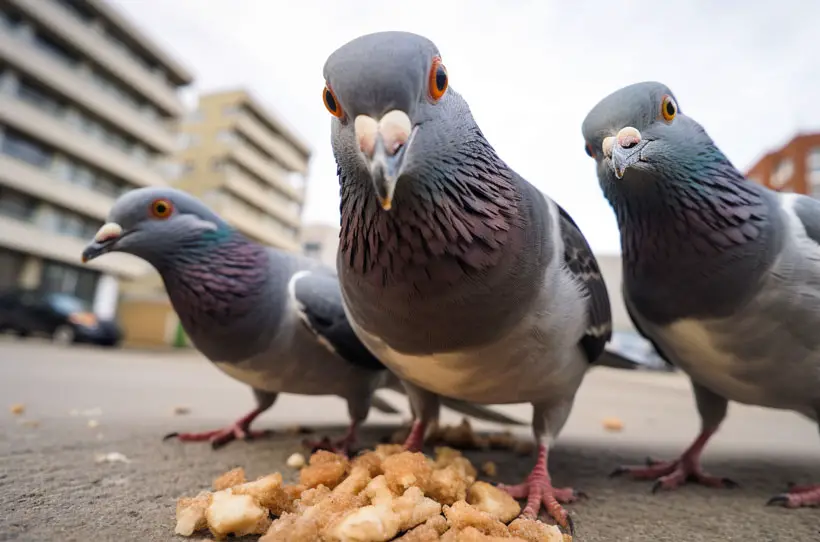
Is Feeding Pigeons Good or Bad?
Feeding pigeons in public places is usually discouraged as it can easily attract large flocks.
These can bring about the risk to public health in terms of diseases, which may spread through their droppings.
Other reasons why you should avoid feeding pigeons include the risk of overpopulation, malnutrition, pollution, and loss of natural behavior for these birds
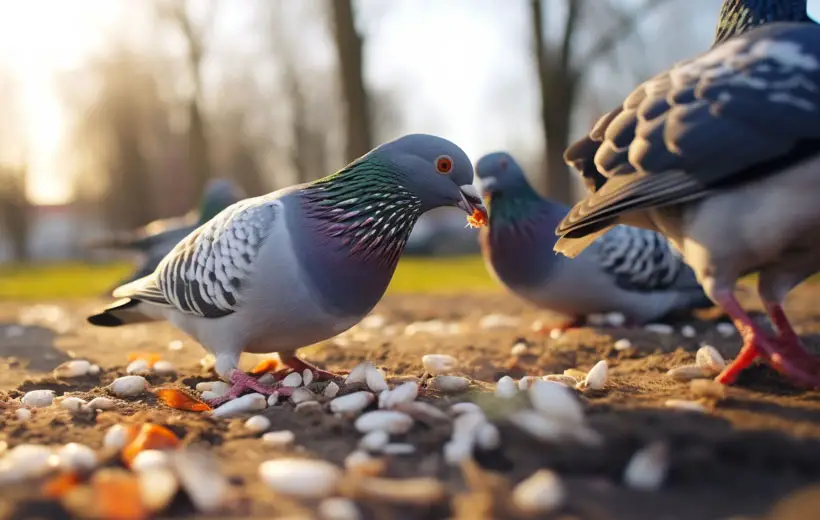
Conclusion
There’s a whole list of foods that are toxic and unsafe for consumption by pigeons. These foods can lead to serious health problems if ingested and include junk foods, salty foods, caffeinated beverages, avocados, garlic, onions, chocolate, alcohol, high-fat foods, uncooked beans, and xylitol. Additionally, you should avoid feeding pigeons any moldy or spoiled foods, fruit pits, and apple seeds.
All these foods can lead to serious health complications in pigeons if ingested, and some can even result in sudden death! While these foods taste great to humans and the temptation to share them with pigeons may be high, we strongly advise giving in to the urge. As a rule of thumb, you should also avoid feeding your pigeon any type of food in excess.
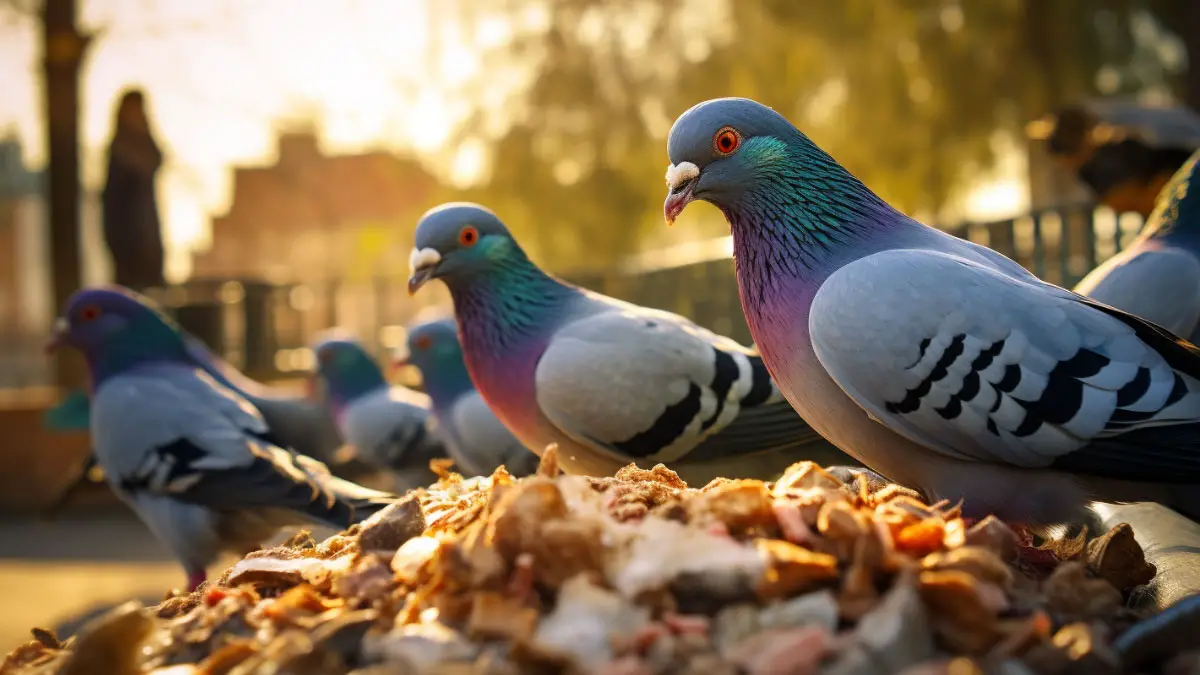
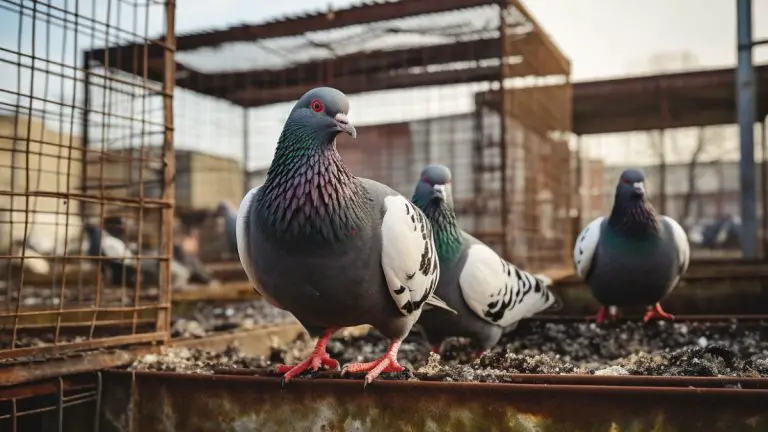
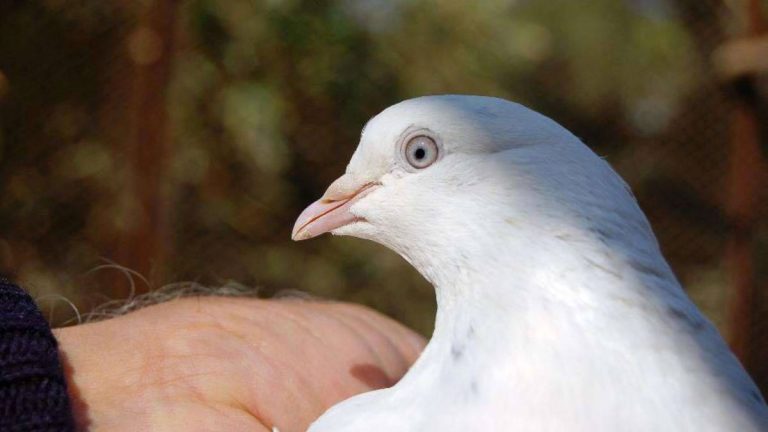
![Do Pigeons Eat Mice? [Everything You Need To Know]](https://avicultureblog.com/wp-content/uploads/2023/01/Do-Pigeons-Eat-Mice.jpg)
